

Psychedelic mushrooms reduce authoritarianism and boost nature relatedness, experimental study suggests. Psilocybin, the active compound in magic mushrooms, could make people feel more connected to nature and less likely to endorse authoritarian views, according to new research from the Psychedelic Research Group at Imperial College London.
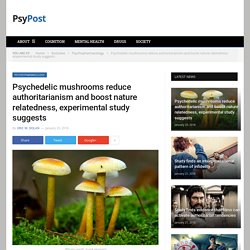
The new study, published in the journal Psychopharmacology, is the first to provide experimental evidence that psilocybin treatment can lead to lasting changes in these attitudes. Study authors Taylor Lyons and Robin L. Carhart-Harris write that “our findings tentatively raise the possibility that given in this way, psilocybin may produce sustained changes in outlook and political perspective, here in the direction of increased nature relatedness and decreased authoritarianism.” Psychedelic drugs have been associated with anti-authoritarian countercultures ever since the hippies of the 1960s. The Neurology of Anxiety in Times of Critical Decision-Making.
Scientists have identified the specific neural circuitry that triggers anxiety in individuals when confronted with critical decisions.
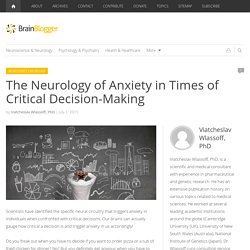
Our brains can actually gauge how critical a decision is and trigger anxiety in us accordingly! Do you freak out when you have to decide if you want to order pizza or a tub of fried chicken for dinner? No? But you definitely get anxious when you have to decide between schools for your kid or figure out which job offer to accept — the one that will keep you tied to your desk and pay you a hefty paycheck or the one that promises a lot of adventure for peanuts.
There is a reason why we get anxious when we have to make certain decisions, and why we decide on other matters without batting an eyelid. A mystery solved leads to a discovery It was pure chance that led scientists to stumble upon the fact that the human brain processes decision-making activities of varying degrees of criticality in different regions. The framing effect References Image ID: 147180335. Discovery of ‘mini-neural computer’ multiplies the brain’s processing power. Dendrites, the branch-like projections of neurons, were once believed to be passive wiring in the brain.
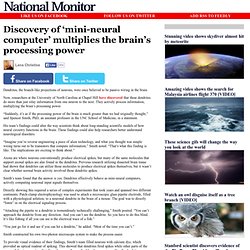
Now, researchers at the University of North Carolina at Chapel Hill have discovered that these dendrites do more than just relay information from one neuron to the next. They actively process information, multiplying the brain’s processing power. “Suddenly, it’s as if the processing power of the brain is much greater than we had originally thought,” said Spencer Smith, PhD, an assistant professor in the UNC School of Medicine, in a statement. His team’s findings could alter the way scientists think about long-standing scientific models of how neural circuitry functions in the brain. These findings could also help researchers better understand neurological disorders.
“Imagine you’re reverse engineering a piece of alien technology, and what you thought was simple wiring turns out to be transistors that compute information,” Smith noted. Researchers Find Mental Workspace in Brain that Helps Humans Imagine : Health & Medicine. Sep 17, 2013 08:27 AM EDT Researchers have now found the elusive "mental workspace", which allows humans to imagine and think creatively.
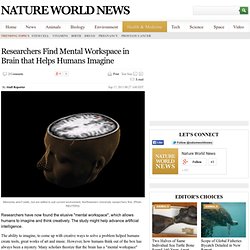
The study might help advance artificial intelligence. The ability to imagine, to come up with creative ways to solve a problem helped humans create tools, great works of art and music. However, how humans think out of the box has always been a mystery. Many scholars theorize that the brain has a "mental workspace" where it manipulates images, sounds and ideas that help us find novel ways to solve problems. Now, Researchers at the University of Dartmouth have found a neural network that resembles the scholars' idea of a work space in the brain where ideas take shape.
Creative thinking can be of different forms such as imagining new visuals, sounds or coming up with new ideas. Health - Drug addiction: The complex truth. Drugs are scary.
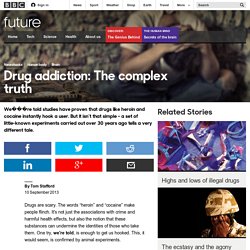
The words “heroin” and “cocaine” make people flinch. It's not just the associations with crime and harmful health effects, but also the notion that these substances can undermine the identities of those who take them. One try, we're told, is enough to get us hooked. This, it would seem, is confirmed by animal experiments. Many studies have shown rats and monkeys will neglect food and drink in favour of pressing levers to obtain morphine (the lab form of heroin). Perceptual learning. Perceptual learning is the process of learning improved skills of perception.
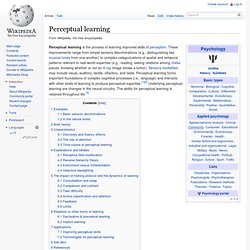
These improvements range from simple sensory discriminations (e.g., distinguishing two musical tones from one another) to complex categorizations of spatial and temporal patterns relevant to real-world expertise (e.g., reading, seeing relations among chess pieces, knowing whether or not an X-ray image shows a tumor). Sensory modalities may include visual, auditory, tactile, olfactory, and taste. Perceptual learning forms important foundations of complex cognitive processes (i.e., language) and interacts with other kinds of learning to produce perceptual expertise.[1][2] Underlying perceptual learning are changes in the neural circuitry.
The ability for perceptual learning is retained throughout life.[3] Examples[edit] Basic sensory discriminations[edit] Laboratory studies reported many examples of dramatic improvements in sensitivities from appropriately structured perceptual learning tasks. Brief history[edit] ‘Sixth sense’ in human brains mapped by researchers. Population receptive field modeling - Search results.